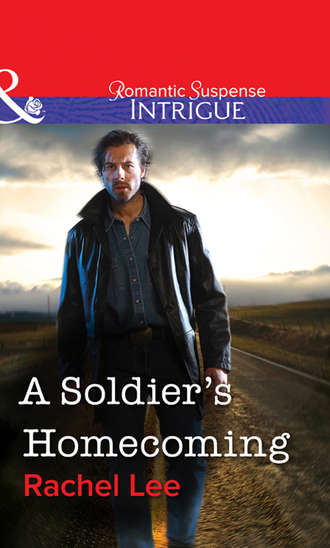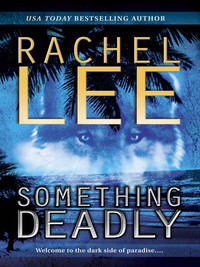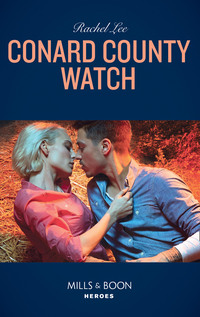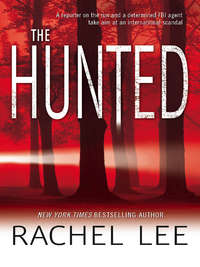
Полная версия
A Soldier's Homecoming

A Soldier’s Homecoming
Rachel Lee

www.millsandboon.co.uk
Table of Contents
Cover Page
Title Page
About the Author
Chapter One
Chapter Two
Chapter Three
Chapter Four
Chapter Five
Chapter Six
Chapter Seven
Chapter Eight
Chapter Nine
Chapter Ten
Chapter Eleven
Chapter Twelve
Chapter Thirteen
Chapter Fourteen
Chapter Fifteen
Chapter Sixteen
Chapter Seventeen
Chapter Eighteen
Chapter Nineteen
Chapter Twenty
Chapter Twenty-One
Copyright
RACHEL LEE was hooked on writing by the age of twelve and practised her craft as she moved from place to place all over the United States. She now resides in Florida and has the joy of writing full-time.
Her bestselling Conard County series has won the hearts of readers worldwide and it’s no wonder, given her own approach to life and love. As she says: “Life is the biggest romantic adventure of all – and if you’re open and aware, the most marvellous things are just waiting to be discovered.”
To Mom, who got me started. I will always miss you
Chapter One
Deputy Constance Halloran drove along the U.S. highway toward Conard City, taking her time, keeping an eye on traffic, glad her shift was almost over.
Spring had settled over the county, greening it with recent rains, filling the air with the fragrance of wildflowers and the scent she thought of as green. With her window rolled down, the aroma wafted into her car, earth’s special perfume.
Today had been a lazy day, an easy shift. She’d had only one call about a minor theft at one of the ranches; then she’d spent most of the day patrolling her sector. She hadn’t written any speeding tickets, which was unusual. Even the traffic seemed to be enjoying a case of spring fever.
Maybe she would light the barbecue tonight and make some hamburgers. Sophie, her seven-year-old daughter, loved grilled hamburgers beyond everything, and loved the opportunity to eat outside at their porch table almost as much. Of course, the evenings could still get chilly, but a sweater would do.
The idea pleased her, and she began to hum a lilting melody. A semi passed her from the opposite direction and flashed his lights in a friendly manner. Connie flashed back, her smile broadening. Some days it felt good just to be alive.
Another mile down the road, she spotted a man standing on the shoulder, thumb out. At once she put on her roof lights, gave one whoop of her siren and pulled over until he was square in the view of her dash camera. He dropped his arm and waited for her.
A couple of cars passed as she radioed dispatch with her position and the reason for her stop.
“Got it, Connie,” Velma said, her smoke-frogged voice cracking. “You be careful, hear?”
“I always am.”
Glancing over to make sure she wouldn’t be opening her door into traffic, Connie climbed out and approached the man.
As she drew closer, she realized he looked scruffy and exotic all at once. Native American, she registered instantly. Long black hair with a streak of gray fell to his shoulders. He also had a beard, unusually thick for someone of his genetic background. Dark eyes looked back at her. The thousand-yard stare. She’d seen it before.
For an instant she wondered if he was mentally ill; then her mind pieced together the conglomeration of clothing he wore, and she identified him as a soldier, or maybe a veteran. His pants were made of the new digitized camouflage fabric, but his jacket was the old olive drab. As she approached, he let a backpack slip from his shoulder to the ground, revealing the collar of his cammie shirt, and she saw the black oak leaf of a major.
At once some of her tension eased. “I’m sorry, sir,” she said courteously, “but hitchhiking is illegal.”
He nodded, his gaze leaving her and scanning the surrounding countryside. “Sorry, I forgot. Been out of the country.”
“I guessed that. Whereabouts?”
His inky gaze returned to her. “Afghanistan. I’ll just keep walking.”
“No,” she said impulsively, breaking all the rules in an instant. “I’ll drive you to town. How come you don’t have a car?”
Something like amusement, just a hint, flickered swiftly across his face. “I need to be home a while longer before I’ll be comfortable behind the wheel.”
She let that go, sensing the story behind it wasn’t something he was about to share. “Well, hop in. I’m going off shift, so unless something happens, I’ll have you in town in twenty minutes.”
“Thanks.”
He hefted his backpack and followed her to the car. Breaking more rules, she let him sit in front with her, rather than in the safer backseat cage. Even in the large SUVs the department preferred, he seemed too big. Over six feet, easily, and sturdily built.
She reached for her microphone and called the dispatcher. “I’m back on the road, Velma, on my way in. I’m giving someone a ride.”
Velma tutted loudly. “You know you shouldn’t.”
“It’s a special case.”
“Whatever.” Velma sounded disgusted in the way of a woman used to having her good advice ignored.
Connie signed off and smiled at her passenger. “Velma is the department’s mother.”
He nodded, saying nothing. A few seconds later they were back on the road, heading down the highway toward town. They passed a herd of cattle on a gentle slope, grazing amicably alongside a group of deer. In places the barbed-wire fences were totally hidden in a tangle of tumbleweed. Indian paintbrush dotted the roadside with scarlet and orange, as if the colors had been scattered by a giant hand.
“It’s beautiful country,” Connie remarked. “Are you staying or just passing through?”
“A bit of both.”
“You have friends here?”
“Sort of. Some folks I want to see, anyway.”
She opened her mouth to ask who, then swallowed the words. He didn’t seem to want to talk much—maybe with good reason, considering where he’d been. She thought of Billy Joe Yuma, her cousin Wendy’s husband, and the problems he still suffered sometimes from Vietnam. This guy’s wounds had to be fresher.
When she spoke again, it was to ask something less invasive. “Ever been here before?”
“No.”
Well, that gambit wasn’t going to work. Stifling a sigh, she gave her attention back to the road and tried to ignore the man beside her. If he stayed in town for more than twenty-four hours, someone would learn something about him and word would pass faster than wildfire. The county had grown quite a bit in the past fifteen years, but it hadn’t grown much. People still knew everything about their neighbors, and strangers still attracted a lot of curiosity and speculation.
However, it went against the grain for her to treat a stranger with silence. Around here, folks generally made strangers feel welcome.
“I can take you to a motel if you want.”
“Sheriff’s office is fine.”
“Okay.” A scattering of houses near the road announced that Conard City now lay less than ten miles ahead. “My uncle used to be sheriff here,” she said by way of keeping a friendly conversation going.
“Yeah?”
At last a sign of curiosity. “He retired a couple of years ago,” she explained. “He and my aunt are in South America and are later going on a cruise to Antarctica. It blows my mind to even think of it.”
That elicited a chuckle. “It wouldn’t be my choice.”
“Mine, either, right now. Maybe when I retire I’ll see things differently.”
“You never know.”
She tossed him another glance and saw that he appeared a bit more relaxed.
“So,” he said after a moment, “you followed in your uncle’s footsteps?”
“Eventually. I grew up in Laramie. Then I moved to Denver.”
“How’d that work out?”
“Well, I got my degree, got married, got divorced, decided I didn’t like the big bad world all that much and came back to be a deputy.”
“What’s that like?”
“I love it.” She glanced at him again, wondering what had suddenly unlocked the key to his mouth. But he seemed to have gone away again, looking out the windows, watching intently. So on guard. Expecting trouble at any instant.
And there were no magic words to cure that. Nothing but time would do that, if even that could succeed.
“I worked as a cop in the city,” she said after a moment. “It’s better here.”
“Why?”
“Less crime. More helping people.”
“I can see that.”
She reckoned he could.
“So do you like your new sheriff?”
“Gage Dalton,” she supplied. “Yeah. He can be hard to get to know, but once you do, he’s great. He used to be DEA, then he came here and my dad hired him as a criminologist. We never had one before.”
“That is small-town.”
She smiled. “Yeah. It’s great.”
They reached the edge of town, and soon were driving along Main Street toward the courthouse square and the storefront sheriff’s office. On the way, she pointed out the City Diner.
“Eat there if you want rib-sticking food. Despite the sign out front, everyone calls it Maude’s diner. You won’t find high-class service, but if you’re not worried about cholesterol, sugar or salt, there’s no better place to get a meal or a piece of pie.”
“I’ll remember that.”
She pulled into her slot in front of the office and turned off the ignition. Before he climbed out, she turned in her seat to face him directly. “I’m Connie Halloran,” she said.
“Ethan. Thanks for the ride.”
Then he slipped out of the vehicle with his backpack and began to stride toward the diner. She watched him until he disappeared inside, then shook her head and climbed out, locking the car behind her.
Inside the office, Velma arched thin brows at her. “You’re still alive, I see.”
“I’m not totally stupid.”
“Just save the excuses until your uncle gets back.”
Connie shook her head and hung her keys from the rack near Velma’s dispatch station. “I’m all grown up, Velma.”
“That won’t matter a flea dropping on a compost heap if anything happens to you. I don’t want to be the one explaining to Nate what you did.”
Connie leaned over the counter, grinning at the older woman. “I’m armed and dangerous, Velma.”
All that earned was a snort. “Damn near everyone around here is armed. It don’t keep bad things from happening.”
“Nothing bad happened. Now I’m going to sign out and go home to grill burgers for my daughter and my mother.”
But Velma stopped her. “Who’d you give a ride to?”
“Some guy named Ethan. He says he has some friends around here.”
“And you believe that?”
Connie sighed. “Why wouldn’t I? He’s wearing a major’s oak leaf on his shirt collar, and he says he just got back from Afghanistan. Not your ordinary bad-guy disguise.”
Velma’s expression soured. “For somebody who patrolled the streets in Denver, you’re awfully trusting.”
“No, I just know how well I can take care of myself.”
Velma’s snort followed her out the door.
Chapter Two
Gage Dalton, Conard County’s new sheriff—for three years now, which he guessed meant he would always be the new sheriff—sat at his desk reviewing reports, his scarred face smiling faintly as he remembered how Nate Tate used to complain about the paperwork. Nate had been sheriff for thirty-five years, a long time to complain about paperwork. As for Gage, he would count himself lucky if twenty years from now he was still the new sheriff and still doing paperwork.
Not that folks gave him a hard time or anything. It was, he supposed, just their way of distinguishing him from Nate. He signed another report and added it to the stack of completed work.
Not much happened in this county on a routine basis. Cattle disappeared or were killed under strange circumstances. That whole cattle-mutilation thing still hovered around, leaving questions whose answers never entirely satisfied the ranchers.
Break-ins, vandalism—more of that over the past few years as the county grew and bored youngsters got ideas from movies, television and gangsta rap. Although, to his way of thinking, the growing size of the younger population probably meant that, percent-age-wise, there was no more crime than ever.
There were new jobs, though. When he’d first moved here fifteen years ago, the county had been losing many of its young folks to brighter city lights. Then the lights here had grown a bit brighter when a semiconductor plant was set up outside town. Easier work than ranching. Good wages. Folks had moved in, and more kids stayed, especially now that they had a local college, too.
Small changes with outsize impact. Nothing threatened the old way of life here yet, but it sure was odd to see kids wearing saggy, beltless, shapeless pants, as if the whole world wanted to see their underwear, instead of boot-cut jeans and ropers. Among the younger set, the cowboy hat had been completely replaced by the ball cap. Sometimes Gage grinned, because it was all familiar to him from the days before he moved here. It had just taken longer to arrive than he had, that was all.
Velma buzzed him on the intercom. “Sheriff? There’s a man here looking for Micah.”
Gage didn’t hesitate. “Send him back.”
Maybe he remained overly cautious from his DEA days, but Gage was protective of his deputies, their addresses and their whereabouts. Velma’s description had spoken volumes. She hadn’t given the visitor a name, which meant he wasn’t local. Gage went instantly on guard.
A half minute later, a tall dark man appeared in Gage’s doorway. Gage experienced an instant of recognition so fleeting it was gone before he could nail it down.
“Come in,” he said to the stranger, rising to offer his hand.
The man took it and shook firmly, giving Gage a chance to study him. His first guess was Native American, but the thick beard threw him off. Coppery skin tone, but that could be from the sun. Chambray shirt and jeans.
“Gage Dalton,” he said. “Have we met before?”
The man shook his head. “Major Ethan Parish.”
At once Gage stilled. He studied the man even more closely, and now the instant of recognition made sense. “You look a bit like him. Related?”
Ethan nodded.
“Well, take a seat.”
The two men sat facing each other across the expanse of the old wood desk with its stacks of papers.
“Does Micah know you’re here?” Gage asked.
“No.”
“I see.” Gage drummed his fingers on the desk for just a moment. He recognized the look in Ethan Parish’s eyes. Micah still showed it on occasion, as did Billy Joe Yuma, the county’s rescue pilot. He had also seen the look on the faces of his fellow DEA agents when they’d been on the streets too long. Sometimes he saw it in his own mirror.
“Look,” he said after a moment. “If Micah doesn’t know you’re here, I don’t feel I should be telling you how to find him. Maybe you should call him.”
“This isn’t something I want to do on the phone.”
“Why not?”
Ethan Parish hesitated, looking past Gage as if debating how much to tell.
“Tell you what,” Gage said after a few moments. “Tell me who you are. Something about yourself.”
“Marine recon, special operations. One tour in Iraq, two in Afghanistan. Other things I can’t tell you about. I won’t be going back. Medical discharge.”
“You were wounded?”
“More than once.”
Gage nodded. “I’m sorry.”
Ethan Parish merely looked at him. “I’m better off than many.”
Gage nodded again. “Still walking.”
Ethan nodded once. “And talking. Anyway, I’ll be officially discharged within the next six months.”
“Need a job?”
“If I stay here.”
Gage rubbed his chin and settled back in his chair. “How’s Micah fit in the picture?”
Ethan’s mouth tightened.
“Look, you know about protecting your men. I’m no different.”
That seemed to cause a shift in the man facing him. At last Ethan relaxed a hair. “This can’t get out.”
“Believe me, I know how to keep a secret. I was undercover DEA before I came here.”
That did the trick. “Micah Parish doesn’t know it, but he’s my father.”
Gage froze. “Oh, hell,” he said finally. “This could raise a real storm.”
“That’s why I don’t want it getting out until I talk to him.”
“I can sure understand that.” Gage paused to think again. “Okay,” he said finally. “Tell you what I’ll do. Micah’s on his day off, so I’ll drive you out to his ranch. But you better not tell his wife who you are before you get a chance to talk to him in private.”
“That’s how I was hoping to handle it.”
“Then we see eye-to-eye. Come on, let’s go. You can think up a cover story while we drive.”
That afternoon, Connie’s world blew up. It happened the way such things do, utterly without warning, and in an instant that was otherwise utterly benign.
On her day off, she always had plenty to do. Her mother, disabled by a severe fall several years ago, helped as much as she could, but being stuck in a wheelchair severely limited her activities. In many ways she created extra work for Connie, but it was work she didn’t mind, because she didn’t know how she would have been able to hold a job and care for Sophie properly at the same time without her mother there.
Sophie had reached the amazing age of seven, when girls start to act like little mothers, developing a streak of independence and becoming downright bossy. So far, Sophie’s imitation of motherhood had proved more amusing than anything else, although Connie suspected that at some point they would need to have a discussion before the girl alienated all her friends by bossing them around.
“Perfectly normal,” Connie’s mother said. “All girls do it. It’d be worse if she had a brother.”
“I suppose.”
Connie climbed down from the ladder where she’d been spackling a small crack in the ceiling. Some major problems had begun to brew in the old house, but she couldn’t afford to deal with them yet. “Want some coffee, Mom?”
“I’ll never pass up a cup of coffee,” Julia answered. “You know that. You don’t even have to ask.”
“Sophie should be home soon,” Connie remarked as she washed both her hands and the spackling knife at the sink. “She’d better hurry. It looks like we might get a storm.”
Julia turned her wheelchair so she could look out the tall window over the sink. “So it does. I wanted to ask you something.”
Connie grabbed a towel to dry her hands and turned, leaning back against the counter. She raised her eyebrows. “I always hate it when you say that.”
“Why?”
“Because it always means it’s not an ordinary question.”
Julia laughed. “Well, you’re too old for me to send to your room, so I think you’re safe.”
Connie laughed, too. Just at the edge of hearing, she heard a rumble of thunder. “What is it?”
“I want to get Sophie a dog.”
“Oh. Is that all?” Connie draped the towel on the rack by the sink.
Julia cocked her head to one side. “I don’t know how to take that.”
“Well, take it that I’m listening. Why do you want to get her a dog?”
“She’s been asking for one. And Pru’s dachshund just had a litter.”
“A little dog, huh?”
“Well…” Julia drew the word out.
“Well, what?”
“Pru’s not sure who the father is. And some of the pups have pretty big feet.”
Connie couldn’t help the laugh that escaped her. “Do you know what an image that is? A dachshund with those short, short legs and huge feet?”
Julia laughed, too.
“Sort of like a basset hound,” Connie remarked. “Long, low and short. It’s okay if she gets a dog, Mom. But she’s got to take care of it.”
“I was thinking it would be a chance to use her mothering urges on something besides her friends.”
“Every little bit helps. Just be sure you’re comfortable with the idea, because you know Sophie is going to forget at times.”
“I’m a great reminder.”
“Nag, Mom. The word is nag.”
They were still laughing together when Sophie burst into the room with her best friend, Jody, out of breath and looking scared.
“Mom! Mom! A man tried to talk to us when we were walking home! He chased us!”
Chapter Three
As Gage’s SUV drove up the rutted drive to Micah’s house, neither man said a word. Then a two-story house with a gabled roof came into view, a barn not far away. A woman was visible outside the house, hanging laundry. She was small and blond, looking as delicate as a flower petal.
“That’s his wife, Faith. The school bus won’t bring their kids home for another half hour, at least. I’ll wait for you unless you tell me otherwise.”
Ethan nodded. His face felt chiseled from stone. Gage wheeled into the large yard, waving at Faith as he did so. She waved back, one hand holding a shapeless piece of laundry.
“There you go,” Gage said. His hands were tight on the wheel as he stopped.
Ethan paused for a moment, then climbed out.
He had no idea what to expect. Faith froze like a frightened deer when she saw him. Statuelike, she watched him approach. He did so slowly, not wanting to frighten her more, wondering why she was frightened at all when Gage was here.
But then, in an instant, she dropped the laundry she held and gasped, “You look just like Micah when he was younger.”
Ethan paused awkwardly. “We’re related.”
“I thought so.” Then she astonished him by hurrying toward him and wrapping him in a hug. “This is wonderful,” she said. “Absolutely wonderful!”
A moment later she stepped back, holding his arms as she looked up at him. Her smile was wide and welcoming, and then perplexity entered her eyes, followed by the wavering of her smile.
“I’m sorry I shocked you,” Ethan said quickly.
Faith shook her head. Biting her lower lip, she continued to search his face. “You look so much like him. You’re not just a cousin, are you?”
She said it more like a statement than a question. Ethan hesitated, not sure whether to lie, and that hesitation apparently gave him away.
“You’re…you’re his son, aren’t you?”
Slowly Ethan nodded. He hadn’t expected to feel gut-punched, hadn’t expected to feel his stomach quiver nervously. He had thought very little could fill him with fear any longer. But he felt fear now, as if everything rested on this small woman’s decision.
There was an instant, just an instant, when she seemed to gather herself; then her smile steadied again. “That’s wonderful. I’m surprised he never mentioned you.”
“He doesn’t know.”
She nodded, almost a rocking movement. “I see. Well, then, this will certainly be a great day for him.”
“I wish I were sure of that.”
A little laugh escaped her. “I am.”
“You’re not upset?”
She tilted her head to one side. “Micah was forty-two when I met him. I’d have to be a foolish woman indeed to think I was his first and only love.”
Tension seeped out of Ethan, allowing him to smile at last. “Thank you.”









